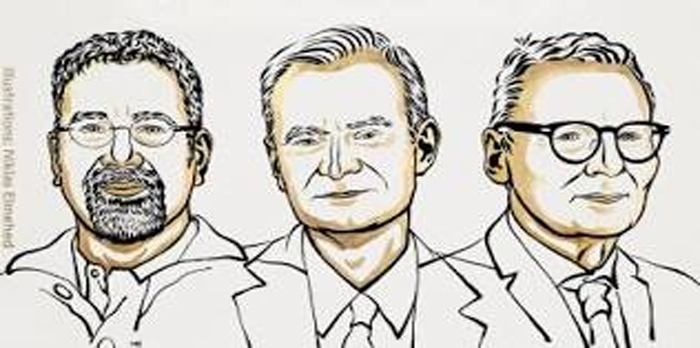The Royal Swedish Academy of Sciences has decided to award the Sveriges Riksbank Prize in Economic Sciences in Memory of Alfred Nobel 2024 to
- Daron Acemoglu
Massachusetts Institute of Technology, Cambridge, USA
- Simon Johnson
Massachusetts Institute of Technology, Cambridge, USA
- James A. Robinson
University of Chicago, IL, USA

This year’s laureates in the economic sciences – Daron Acemoglu, Simon Johnson and James Robinson – have demonstrated the importance of societal institutions for a country’s prosperity. Societies with a poor rule of law and institutions that exploit the population do not generate growth or change for the better. The laureates’ research helps us understand why.
When Europeans colonized different parts of the world, the way societies were organized changed significantly, but not in the same way everywhere. In some places, the colonizers aimed to take advantage of the local people and resources for their own gain. In others, they created systems that included local people for the long-term benefit of European settlers.
The researchers found that the differences in how wealthy countries are today can be linked to the kinds of institutions set up during colonization. Countries that had poor conditions when colonized often ended up with inclusive systems, leading to greater wealth over time. Conversely, some formerly rich colonies became poor due to exploitative institutions.
Countries with extractive institutions may struggle with low economic growth. While inclusive institutions could benefit everyone in the long run, those in power often prefer short-term gains, making it hard to trust their promises for change. This lack of trust can prevent improvements.
Interestingly, this situation can also lead to democracy. When there’s a risk of revolution, those in power might feel pressured to promise reforms. However, the public might not believe these promises, fearing a return to the old ways. Eventually, the only option could be to give up some power and create a democratic system.
Jakob Svensson, the Chair of the Committee for the Prize in Economic Sciences, highlights that reducing income differences between countries is a major challenge today, and the researchers emphasize how important societal institutions are in addressing this issue.
The researchers found that the differences in how wealthy countries are today can be linked to the kinds of institutions set up during colonization. Countries that had poor conditions when colonized often ended up with inclusive systems, leading to greater wealth over time. Conversely, some formerly rich colonies became poor due to exploitative institutions.
Countries with extractive institutions may struggle with low economic growth. While inclusive institutions could benefit everyone in the long run, those in power often prefer short-term gains, making it hard to trust their promises for change. This lack of trust can prevent improvements.
Interestingly, this situation can also lead to democracy. When there’s a risk of revolution, those in power might feel pressured to promise reforms. However, the public might not believe these promises, fearing a return to the old ways. Eventually, the only option could be to give up some power and create a democratic system.
Jakob Svensson, the Chair of the Committee for the Prize in Economic Sciences, highlights that reducing income differences between countries is a major challenge today, and the researchers emphasize how important societal institutions are in addressing this issue.
Daron Acemoglu, born 1967 in Istanbul, Türkiye. PhD 1992 from London School of Economics and Political Science, UK. Professor at Massachusetts Institute of Technology, Cambridge, USA.
Simon Johnson, born 1963 in Sheffield, UK. PhD 1989 from Massachusetts Institute of Technology, Cambridge, USA. Professor at Massachusetts Institute of Technology, Cambridge, USA.
James A. Robinson, born 1960. PhD 1993 from Yale University, New Haven, CT, USA. Professor at University of Chicago, IL, USA.
The Nobel memorial prize in economics has been awarded to Daron Acemoglu, Simon Johnson and James A. Robinson for research into differences in prosperity between nations.
The three economists “have demonstrated the importance of societal institutions for a country’s prosperity,” the Nobel committee of the Royal Swedish Academy of Sciences said.
Review of Power and Progress: Unequal world
“Societies with a poor rule of law and institutions that exploit the population do not generate growth or change for the better. The laureates’ research helps us understand why,” it added.
The announcement was made Monday in Stockholm.
Acemoglu and Johnson work at the Massachusetts Institute of Technology and Robinson conducts his research at the University of Chicago.
The economics prize is formally known as the Bank of Sweden Prize in Economic Sciences in Memory of Alfred Nobel. The central bank established it in 1968 as a memorial to Nobel, the 19th-century Swedish businessman and chemist who invented dynamite and established the five Nobel Prizes.
Though Nobel purists stress that the economics prize is technically not a Nobel Prize, it is always presented together with the others on December 10, the anniversary of Nobel’s death in 1896.